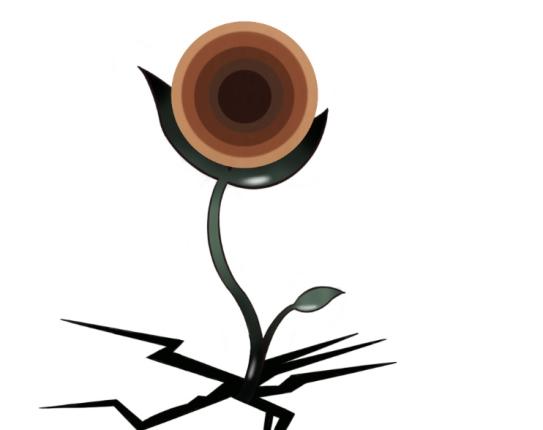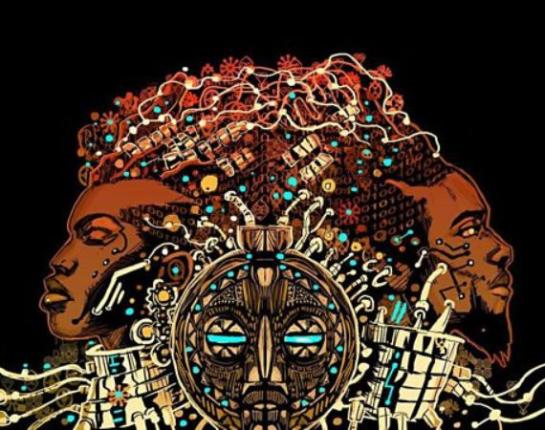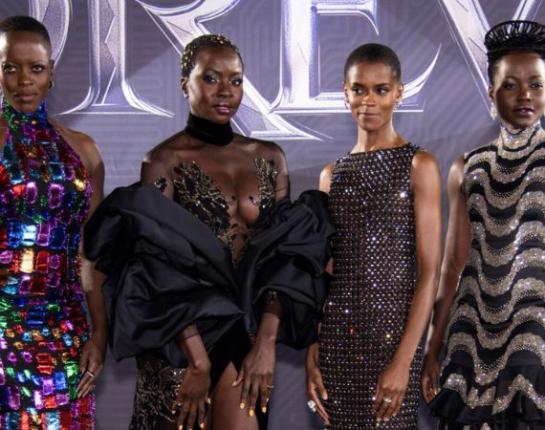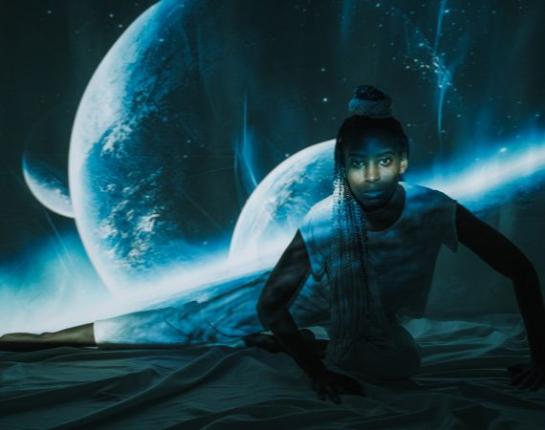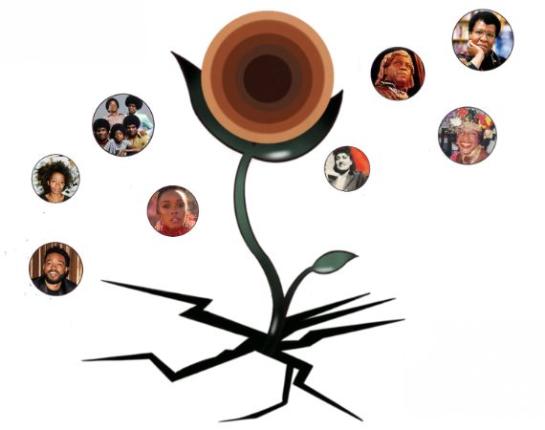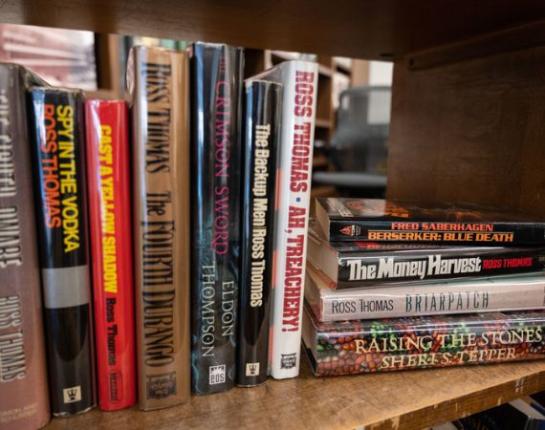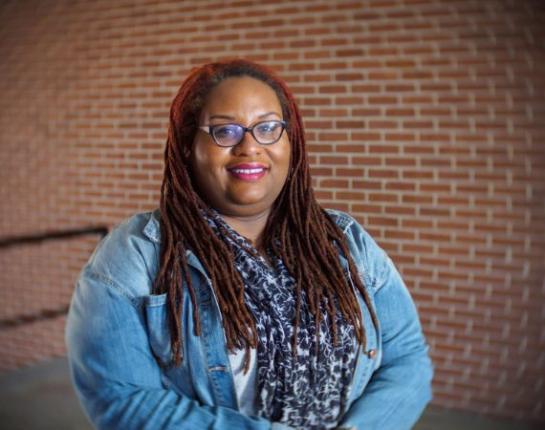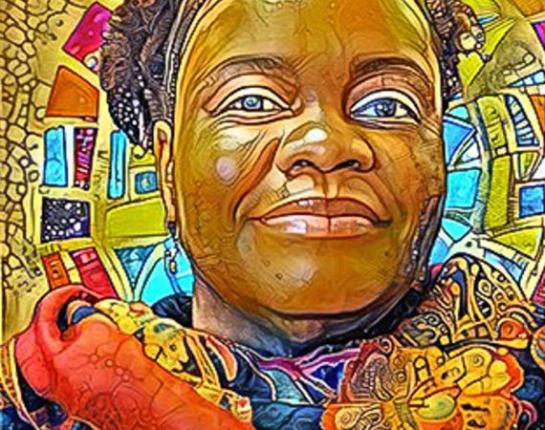Lisa Yaszek is a Regents' Professor of Science Fiction Studies in the Georgia Tech School of Literature, Media, and Communication. She explains what Afrofuturism is and why it's important, and shares some of her favorite works from influential Afrofuturists past and present.
Quick Navigation
Jump to roundups on:
- What to read
- Podcast and radio episodes with our experts
- Ivan Allen College classes, minors, and labs on the topic
- Notable Ivan Allen College faculty and alumna in the field
What is Afrofuturism?
Afrofuturism is an aesthetic practice that enables artists to communicate the experience of science, technology, and race across centuries, continents, and cultures.
While the popularity of Afrofuturist directors such as Ryan Cooler and Afrofuturist musicians such as Janelle Monae make it seem like a very recent and modern phenomenon, Afrofuturism is really a multigenerational multimedia project carried out by Black artists since before the founding of the U.S. itself. These creators blend science fiction, fantasy, and horror techniques with Afrodiasporic histories and African cosmologies to tell exciting and thought-provoking stories that enrich our understanding of history and imagine futures in full color.
In its most science-fictional forms, Afrofuturism is often organized around what I call the figure of the "Black genius," a young person who uses both modern technologies and heritage or indigenous sciences to save themselves, their families, and their communities from both extraterrestrial/supernatural and domestic threats.
Why is it important?
Afrofuturism is important because it enriches our understanding of the past, present, and many possible futures.
Since they first began really talking about it in the 1990s, artists and scholars have understood Afrofuturism as an extension of the historical recovery projects that black Atlantic intellectuals have engaged in for over two hundred years.
Toni Morrison explains that such projects demonstrate how the conditions of homelessness and alienation experienced by enslaved Africans and their descendants anticipate what the philosopher Friedrich Nietzsche claimed were the founding conditions of modernity. Soon, other scholars — including myself! —began exploring Afrofuturist art as enriching our understanding of modern history by reminding us of the many ways that Black people contributed to developing our technoscientific present.
As a literary and cultural historian, that is incredibly important work. We tend to think that we are the first generation to experience certain kinds of scientific and social relations, but the reality is that other people have faced similar challenges in the past and lived to make art out of their experiences. Connecting with that art connects us to history and can even give us templates for building better futures for Black communities, humanity, and the world.
As a science fiction scholar, my favorite thing about Afrofuturism is that it reminds us that humans can intervene in the material and social world and create a whole host of futures, many of which depart from the futures-as-usual that we get from the mainstream media.
British-Ghanaian music critic Kodwo Eshun argues that Black-created stories about “travel through time and space” and “encounters with the alien other” are more than just a way to bring Afrodiasporic historical experiences to life for new audiences. Riffing on the great sociologist and sci-fi author W.E.B. Du Bois, Eshun proposes that science fiction is a way to double, triple, and even quadruple our collective consciousness about the range of race relations that might exist in the future and the range of futures those relations might engender. It’s an exciting message for all people who want to believe that the Earth and the stars are for everyone.
Who are the most influential Afrofuturists past and present?
As a science fiction scholar specializing in recovering lost women’s voices and discovering new ones, I want to recommend some of my favorite women who write Afrofuturism.
Indeed, whenever I talk about or teach Afrofuturism these days, I argue that it really begins with a woman: the enslaved African American author Phillis Wheatley.
In particular, Wheatley’s 1773 poem “On Imagination” depicts Black artists ascending to the celestial realms to roam the galaxy, taking its measure and transforming their newfound knowledge into art. In short, she was the first person we know of to depict Black people as Star Children and the Black imagination as the Mothership.
At the turn of the 20th century, author, essayist, and editor Pauline Hopkins’ Of One Blood challenged readers’ assumptions about science, technology, race, and gender with its depiction of a 7000-year-old African civilization built on advanced blue and green technologies, hidden from jealous white neighbors by an invisibility cloak, and protected by a squad of elite female warriors — all of this well over six decades before Wakanda was even a gleam in Marvel’s eye.
And then there is my personal favorite from this era: Lillian B. Horace, the first Black woman in Texas to own and operate her own press. Horace's 1916 utopian novel Five Generations Hence imagines a future where Black women are political leaders, scientific experts, and brave explorers. Still, it really revolves around a young Black woman torn between her sense of communal obligation to do political uplift work and her personal desire to write science fiction. (Plot spoiler: it turns out she can do both.)
Of course, men have always been essential contributors to Afrofuturism as well. From 1859 to 1862, Martin Delany published the thrilling serial, Blake, or the Huts of America, in the Anglo-African and Weekly Anglo-African Magazines. It maps the adventures of a free African-Caribbean man forced into slavery in the U.S. South. When his owners sell his wife away, he sets out to find his beloved, learning stories of Black survival and helping others fight for freedom. Eventually, he finds his wife, and they join a revolutionary group in Cuba that plans to combine African agricultural knowledge with Western technical know-how to create a global cotton empire that economically destroys the U.S. and thus ends slavery. All the proceeds from the story went to a fund to send escaped and free Black people to West Africa, where they would use the technical knowledge they learned in the U.S. to partner with African farmers to create a global cotton empire to economically destroy the U.S. and thus end slavery! It’s an astounding example of art not imitating life but serving as a blueprint for a better future.
In the early 20th century, the great African-American sociologist W.E.B. Du Bois used science fiction to dramatize many sociological ideas he could not get government or corporate funding to explore. And, as the student research team in my Sci Fi Lab is currently discovering, the African-American newspapers of the early and mid-20th century were home to a host of speculative fiction writers, including the conservative journalist George Schuyler, who used the pseudonym Samuel I. Brooks.
Schuyler wrote radical science fiction stories such as 1931’s Black No More, about a Black genius who tries to abolish racism in America by creating a technique for turning Black people white, and the 1936 to 1938 serial Black Empire, a near-future military story in which Black geniuses around the world work together to destroy the U.S. and Europe’s colonial might and establish a Black global utopia. The utopia is founded on blue and green technologies, and Black Empire includes the first literary description of hydroponics.
Since the mid-20th century, men, like women, have played important roles in bringing Afrofuturist storytelling techniques to science fiction. Samuel Delany was one of the first Black (and openly gay) men to publish stories about futures in full color in the mainstream speculative fiction community. Today, Tobias Buckell writes thrilling space operas that merge the conventions of classic science fiction with Afrofuturism and Caribbean culture. Eisner award-winning artist John Jennings creates graphic novels based on the work of other Afrofuturists, such as Octavia Butler, and will debut a new Afrofuturist superhero, Ghost Light, for Marvel Comics.
Atlantafuturism
Today, I think some of the most exciting Afrofuturist art is happening right here in Atlanta, especially amongst the authors and artists who are part of the “Atlantafuturism” movement — that is, stories that challenge our assumptions about science, technology, and race while celebrating the futures in full color that might begin here in Georgia Tech’s hometown.
Kyoko M. is a USA Today best-selling author who writes the urban fantasy Black Parade series and contributed to the Marvel Comics’ Black Panther: Tales of Wakanda anthology. Kortney Y. Watkins is a professor, business owner, and author who appears in both Terminus: Black Fantastic Tales from the ATL volumes. I think it’s exciting that students can take classes here in Georgia with practicing Black speculative writers!
Violette L. Meier is a supernatural fiction, fantasy, sci-fi writer, poet, folk artist, herbalist, and spiritual revolutionary who writes paranormal, urban, and science fantasy, as well as science fiction, focused on strong women and marginalized communities. I especially recommend her Hags, Haints, and Hoodoo: A Supernatural Short Story Collection.
Bill Campbell and Ed Hall’s 2013 anthology Mothership: Tales from Afrofuturism and Beyond features authors from all over the world, but Campbell got his start in fiction writing while living in Atlanta, and Ed Hall, who is still here, is one of the founding members of the Atlantafuturism movement.
Other important Atlantafuturists include Milton Davis, owner and publisher of MVMedia, one of the only presses in the world specializing in Afrofuturist fiction; Balogun Ojetade, whose Black superhero role-playing game Granma’s Hand (2021) was a Hugo Award finalist; and graphic novelist Dedren Snead, founder of the multimedia Black creators’ collective, Subsume, located in Underground Atlanta, just a short train ride from Georgia Tech!
And finally, I want to recommend one wonderful Atlanta-based Afrofuturist visual artist: Drew Borders, who was commissioned by the city to create a mural on the Atlanta beltline called “The Fates,” which celebrates the women of her family and her greater community who made Atlanta what it is today.
Read More
In her Earthseed Project, Susana Morris, an assistant professor in Georgia Tech's School of Literature, Media, and Communication, and her graduate assistants compiled a bibliography of hundreds of Afrofuturist works. The website also has a timeline of the history of Afrofuturism, "with special attention to often overlooked Afrofuturist women, non-binary, and LGBTQIA people in the field," Morris notes.
Every year, the sci-fi experts on our faculty recommend books that genre-lovers and newbies alike should read next. Often, Afrofuturist media makes the list.
In our 2020 Isaac-Asimov-themed roundup Morris recommends An Unkindness of Ghosts by Rivers Solomon. And in our 2022 list of hopeful science fiction novels, Yaszek suggested multiple Afrofuturism works, including Of One Blood by Pauline Hopkins, Brown Girl in the Ring by Nalo Hopkinson, and The City We Became by N.K. Jemisin.
Did you know that the Georgia Tech Library has one of the best science fiction collections in the world? With hundreds of books on Afrofuturism, it's another great place to continue learning about the topic. For a more scholarly take on Afrofuturism, you can also check out some of Yaszek and Morris' article publications:
- "Afrofuturism, Science Fiction, and the History of the Future" (Socialism and Democracy, 2010)
- "Black Girls Are from the Future: Afrofuturist Feminism in Octavia E. Butler's 'Fledgling'" (WSQ: Women's Studies Quarterly, 2012)
- "Race in Science Fiction: The Case of Afrofuturism" (PDF, 2013)
- "Afrofuturism in American Science Fiction" (The Cambridge Companion to American Science Fiction, 2015)
- "More than Human: Black Feminisms of the Future in Jewelle Gomez's The Gilda Stories" (The Black Scholar, 2016)
Listen
Black Speculative Arts on BBC Radio
Authors Sheree Renée Thomas, Nisi Shawl, Reynaldo Anderson, Andrea Hairston, and Georgia Tech faculty member Susana Morris discuss Afrofuturism and the rise of the Black Speculative Arts movement for BBC radio.
Afrofuturism and Black Women Representation in Marvel's 'Wakanda Forever' on WABE
Lisa Yaszek and Susana Morris join City Lights host Lois Reitzes to talk about Afrofuturism and the role of women in the new film Wakanda Forever.
Black Feminist Futures Series: Black Women and Theories of the Future
Susana Morris joins a virtual conversation at the Schomburg Center's 10th Annual Black Comic Book Festival about Black women's cultural and academic contributions to Afrofuturism past, present, and future.
Lost Sci-Fi Women Writers on Sci-Fi Talk Podcast
Lisa Yaszek discusses women science fiction writers who were lost in time as their works begin to surface again.
Learn
Georgia Tech's School of Literature, Media, and Communication (LMC) has many courses for students interested in learning more about Afrofuturism and Black media.
Taught by faculty such as Morris and Black Twitter expert André Brock, current classes include Afrofuturism, Afrofuturism and the Anthropocene, Introduction to Black Media Studies, Blackness, Media, and Meaning-Making, and Introduction to Black Cultural Production.
For a deeper dive into Afrofuturism, consider completing LMC's Science Fiction Studies or Black Media Studies minor (or both!). You can also join the Earthseed and SciFi Labs to get involved.
Meet
Lisa Yaszek
Regents Professor of Science Fiction Studies at Georgia Tech
Yaszek studies issues of gender, race, and science and technology in science fiction. Her work includes the recovery of lost voices in science fiction history and the discovery of new voices from around the globe.
Susana Morris
Associate Professor of Literature, Media, and Communication at Georgia Tech
Morris is scholar of Black feminism, Black digital media, and Afrofuturism. She is a co-founder of the Crunk Feminists Collective and is working on a book exploring Black women’s relationships to Afrofuturism and feminism.
Nettrice Gaskins
Georgia Tech Digital Media Ph.D. alumna
Gaskins is an artist, author, educator, and researcher. Her AI-generated Afrofuturist art has been displayed at the Smithsonian Arts and Industries Building, Carnegie Hall, and the August Wilson African American Cultural Center among many other exhibitions.



